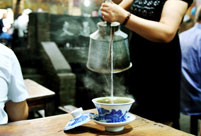 Opps! What a coincidence!
Opps! What a coincidence!
 Breathtaking scenery in Redstone Park in SW China
Breathtaking scenery in Redstone Park in SW China
 Vintage cars show kicks off in London
Vintage cars show kicks off in London
 Gorgeous scenery in NE China
Gorgeous scenery in NE China
 Picturesque Barkol grassland in Xinjiang
Picturesque Barkol grassland in Xinjiang
 Small Wild Goose Pagoda - A World Cultural Heritage Site along the Silk Road
Small Wild Goose Pagoda - A World Cultural Heritage Site along the Silk Road
 Maritime Silk Road Luxuries of the Han Dynasty
Maritime Silk Road Luxuries of the Han Dynasty
 Ciao! Chinese beauties!
Ciao! Chinese beauties!
 An eye feast: BFA freshmen registration
An eye feast: BFA freshmen registration
 Top 10 most lavish weddings
Top 10 most lavish weddings
SHANGHAI, Sept. 28 -- A year after the Shanghai free trade zone (FTZ) was established, reforms piloted in the zone have now been applied elsewhere in the country.
Unlike other economic development zones scattered around China, the Shanghai FTZ does not have much to offer in terms of preferential treatment in taxes and land. Its appeal hinges on broadened access to China's service sector, financial reforms and streamlined administrative procedures.
A total of 21 pilot measures, affecting areas such as business registration, cross-border financing and investment, and customs clearance, have become formal policies applied elsewhere in the country.
According to Wang Zhan, president of the Shanghai Academy of Social Sciences, the FTZ is an example of how opening up to foreign companies and capital has led to a bigger push for reforms at home.
"Just like many other nationwide reforms that were first piloted in Shanghai, the FTZ is also a testing ground for bolder policies high on the central government's agenda for the entire country," Wang said.
The FTZ has made it easier for both domestic and foreign companies to set up businesses in the zone and shifted more focus to regulatory oversight. More than 12,000 companies have been established in the zone, including 1,677 foreign-funded firms.
"Not everyone has a clear idea of what to do in the zone in the rush to register a company there, but real entrepreneurs know that a free and level playing field matters for a successful venture, not subsidies or preferential treatment," Wang said.
NEGATIVE LIST
Foreign companies no longer have to undergo a tedious process of government review and approval of their proposed venture in the free trade zone, as long as their line of business does not appear on a "negative list" of off-limit activities, first published with 196 items when the zone was launched a year ago and shortened to 139 in June.
"The negative list is a move in the right direction. It has broadened foreign companies' access to China's service sector," said Lewis Lu, a partner at accounting firm KPMG's Shanghai office.
"Foreign companies would love to see the list grow shorter and they'd love to see it updated more frequently."
FINANCIAL REFORM
The People's Bank of China, the country's central bank, issued a guideline late last year articulating a string of policies to make cross-border investment, financing and the global use of the Chinese currency, the renminbi or yuan, easier.
The Shanghai Gold Exchange, the world's largest physical gold trading platform, opened China's domestic gold trading market to global investors on Sept. 18, marking the first time offshore investors could participate in the country's spot gold market.
In June, the Shanghai Head Office of the People's Bank of China launched the free trade accounting unit, which allows for free flow of capital between the FTZ and offshore under a closely monitored system.
Ten Chinese banks have connected to the system and opened 4,110 free trade accounts for clients. HSBC and Citi bank are also preparing to be incorporated into the system, said Zheng Yang, director of the Shanghai Financial Services Office, during a briefing about the FTZ on Friday.
"The financial reforms already implemented in the Shanghai FTZ have provided a snapshot of what an offshore financial center looks like on the Chinese mainland: funds can flow freely between the zone and offshore but are subject to curbs when flowing through the rest of the country," said Lin Caiyi, chief economist with the Shanghai-based Guotai Junan Securities.
However, the pace of financial reforms in the FTZ has not lived up to the expectations of many. While the flow of goods has been greatly eased by a more flexible customs clearance system and the lifting of several bans, the flow of capital still faces restrictions.
Zheng indicated on Friday that more measures to enable the free flow of capital, both in the Chinese yuan and other currencies, are in the pipeline.
"We have been monitoring fund flow through these free trade accounts, and they haven't become a channel for hot money or arbitrage," Zheng said, adding that the FTZ will conduct a stress test for further opening of the capital account in the zone.
BROADER ACCESS FOR FOREIGN FIRMS
The FTZ has also made progress in opening more areas in the country's service sector to foreign companies. The State Council, China's cabinet, lifted a 13-year ban on sales of gaming consoles in the FTZ, paving the way for Microsoft to launch its Xbox on the Chinese mainland on the FTZ's one-year anniversary on Monday. Sony is also mulling a joint venture inside the Shanghai FTZ to manufacture and sell its PlayStation in China.
Meanwhile, the FTZ will also host the Chinese mainland's first wholly foreign-funded hospital, as German healthcare group Artemed has inked a deal to build a hospital in the zone, though details have yet to be disclosed.
"Getting people to open business here is not the ultimate purpose of the Shanghai FTZ. It is all about experimenting new policies that have the potential to be replicated elsewhere in the country," KPMG's Lu said.
 Jungle law: leopard preys on impala
Jungle law: leopard preys on impala Female bus driver drives Land Rover for commuting
Female bus driver drives Land Rover for commuting Top 3 iOS 8 features Chinese love most
Top 3 iOS 8 features Chinese love most Century-old public bath closes door in Beijing
Century-old public bath closes door in Beijing Teahouses in Chongqing: Worship to the leisure lifestyle
Teahouses in Chongqing: Worship to the leisure lifestyle Leading director Wang Quan'an detained for 'buying sex'
Leading director Wang Quan'an detained for 'buying sex' Mixed reaction to smartphone sidewalk
Mixed reaction to smartphone sidewalk Amazing aerial photos of China's Xisha Islands
Amazing aerial photos of China's Xisha Islands Top 10 world's highest-paid models 2014
Top 10 world's highest-paid models 2014 Lingerie show at 2014 Miss China
Lingerie show at 2014 Miss China Songstress Li Xianglan dies at 94
Songstress Li Xianglan dies at 94 Police recruiting posters
Police recruiting posters Anshun Daxi- Living fossil of Chinese drama
Anshun Daxi- Living fossil of Chinese drama Urban farmers in China
Urban farmers in China 'Firepower-2014 Weibei'military exercise
'Firepower-2014 Weibei'military exerciseDay|Week|Month